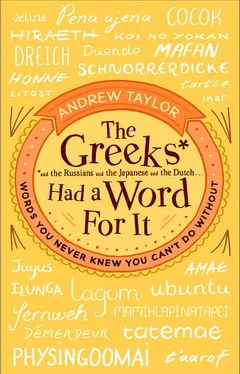So the word has a variety of meanings, which English might try to pick up in several different ways. But the one that might be most useful – the one that Israelis speaking English say they miss most – is when it is used as a gruff, one-word response to someone in authority. In English, if you ask your surly teenage son where he is going, you might get the answer, ‘Out.’ Or if you ask your daughter what she has in her bag, ‘Stuff.’
So in Hebrew, you might ask, ‘Why are you doing that?’ and get the answer, ‘ Davka ’ – because I choose, because I want to do it this way rather than any other. Just because. It’s about expressing determination, independence and a degree of contempt, all in one word.
And don’t we all have a little bit of teenager in us every now and then?
Ilunga
(Tshiluba, Democratic Republic of Congo)
A willingness to let an offence go twice but never a third time
Ilunga ( IL-UNG-AH ) had its fifteen minutes of fame back in 2004, when the BBC reported that it had been chosen as the world’s most untranslatable word in ‘a list drawn up in consultation with 1,000 linguists’. Oddly, the article then went on to translate it with some confidence as ‘a person who is ready to forgive any abuse for the first time, to tolerate it a second time, but never a third time’ – which seems to suggest that it’s actually quite straightforward to translate, if a little lengthy.
The idea of a word being the hardest to translate is a bit strange anyway – certainly until you’ve defined which language you’re translating into. A word that’s hard to translate into English may have a perfect equivalent in Korean or Welsh.
A gradual, even unwilling diminution of sympathy.
Ilunga comes from the Bantu Tshiluba language, spoken by some six million people in the southern region of the Democratic Republic of Congo. Other commentators weighed in to the BBC immediately with their own suggestions, including several who put forward the American saying ‘Three strikes and you’re out’ as an equivalent.
For anyone who knows nothing about the rules of baseball, that sentence would itself be pretty hard to translate, and that fact seems to highlight one of the most intractable difficulties of translation. It’s all very well to replace one word with another – a carretilla in Spain, or a schubkarre in Germany, would probably look very much like a wheelbarrow in England – but it’s the unspoken assumptions and cultural implications that go with a word that can make it almost impossible to replicate in a different language.
‘Three strikes and you’re out’ has a threatening ring to it – an implication that justice is implacable and inevitable. The rules of baseball, after all, are very clear and brook no argument on the subject, which is the reason for carrying the phrase into the administration of the criminal law: there will be no argument and no plea in mitigation. It might even sound rather smug.
That’s certainly not the case with the meaning of ilunga , which describes a gradual, even unwilling diminution of sympathy. The emphasis is on the mercy that is shown at first, rather than on the condemnation that will eventually follow – precisely the opposite of ‘Three strikes and you’re out.’
It may be unrealistic to think that we are such a patient and forgiving people that we need a word which suggests that our first instinct in response to any injury would be forgiveness, and that our preference is always to show mercy until the offender has demonstrated once and for all that he is just going to take advantage of our gentleness. But it’s a very nice idea.
Schlimazl & Shlemiel
(Yiddish)
Someone prone to accidental mishaps & someone clumsy who creates their own mishaps
We all have moments when it seems as if the world is ganging up against us – moments when we’ve spent an hour getting ourselves ready for an important occasion, with a new suit and freshly polished shoes, only for a car to drive past through a puddle and cover us with mud. Moments when we’ve written a particularly fine letter on our computer and are just about to print it out when there’s a power cut. Moments when we sit down on a broken chair that collapses beneath us, or lean against a door that’s just been painted.
We all go through those Charlie Chaplin experiences that would seem very funny if only they were happening to someone else but are near-disasters when they happen to us. For most of us they don’t really happen all that often – it just feels as if they do. But suppose they happened to you all the time – what would you be then, apart from suicidal?
For some people, petty disasters do seem to be a way of life. And if you’re one of them, you’re a schlimazl ( shli-MAZL ). It’s an old Yiddish word that means someone who is chronically unlucky, someone to whom bad things happen all the time. These mishaps are probably nobody’s fault, and they’re not tragedies, not disasters that are going to ruin a person’s life, but they are the ridiculous little accidents that can drive you to distraction. Why me, you say.
However, it could be worse. Suppose it was all your own fault? Rather than have a random car drive past and soak you, you might have tripped over into the puddle all by yourself, stumbling over the shoelace you hadn’t tied properly. Instead of a power cut, you might have lost your beautifully crafted letter because you’d turned off the computer by accident. Maybe the chair was fine, but you were just too heavy for it. And how much more annoying would it have been if you’d painted the door yourself?
In those cases, it would be your own foolishness or clumsiness that was to blame, and instead of being a hapless schlimazl you’d be a hopeless shlemiel ( shlum-EEL ). At least if you’re a schlimazl , when people have finished laughing at you, they’ll feel a moment of sympathy for your hard luck. If you’re a shlemiel , a person who is so clumsy and awkward that you only have to pick up something fragile to drop it, then the chances are that the only response you’re likely to get will be a sneering ‘Serves you right.’
And there are refinements of this miserable fate. Sometimes the shlemiel will resent the reputation he has acquired so much that he will try to do ambitious things that even someone who is not naturally clumsy would avoid, just to prove that he’s not as clumsy as everyone thinks. He – or she – will carry tottering piles of plates and glasses, or scoff at the idea of putting down a piece of newspaper before they start painting. The shlemiel will balance a bowl of soup on his outstretched fingers and move it around in the air, just to prove that he can. And, of course, he can’t. It always ends in tears. Not even Yiddish has a word for such a hopeless case. In fact, the bowl of soup can be used as an example to demonstrate the difference between the two: when the shlemiel spills his soup, it lands on the schlimazl .
The two words are ideal as light-hearted insults – the sort of remarks that elicit a rueful smile and a shrug of the shoulders from their object, rather than a punch on the nose. Surely a language can never have too many words like that.
When it’s all too much bother but, to your mind, not being bothered is not your fault …
We all have them – those moments of angst, world-weariness and frustration when something is just too much trouble. It may be something we’ve done a thousand times before without complaining – taking out the rubbish, washing the car or taking the dog for a walk. Suddenly, for no particular reason, it’s just one thing too many and we’re not going to do it.
Читать дальше












